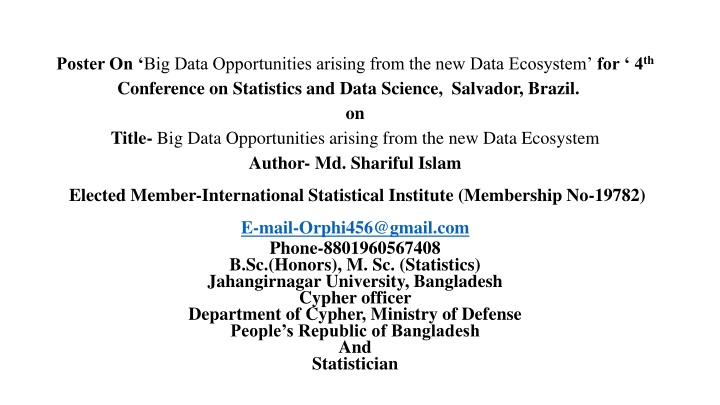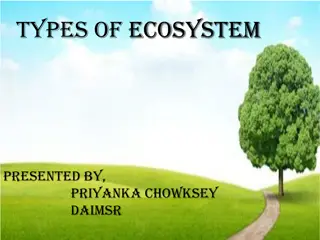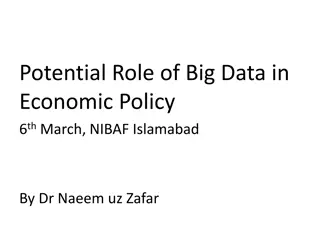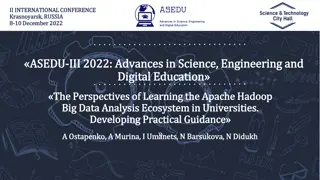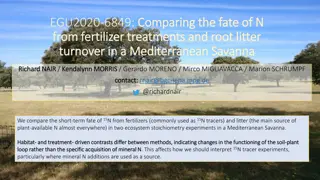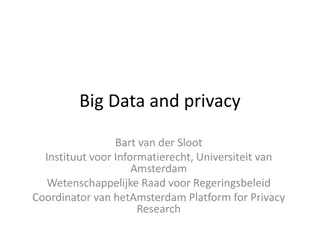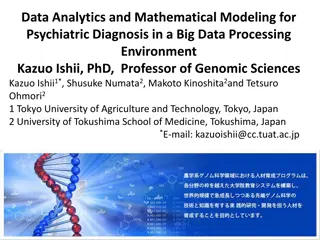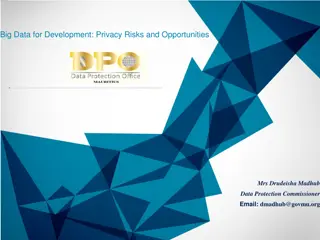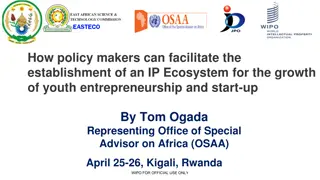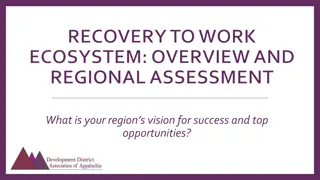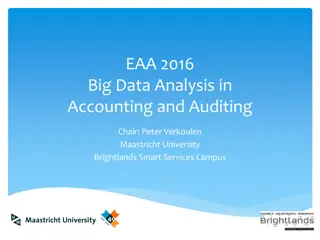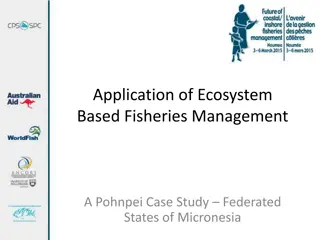Big Data Opportunities in the New Data Ecosystem
A data ecosystem encompasses infrastructure, analytics, and data analysis, fostering partnerships and coordination to leverage the power of data. This ecosystem, driven by Big Data technologies and deep analytical talent, aims to address complex business challenges and drive innovation. The integration of Machine Learning and advanced analytical techniques plays a vital role in shaping the future of data science. Big Data, combined with artificial intelligence, is revolutionizing the scientific landscape and enabling profound insights from vast amounts of data worldwide.
Download Presentation

Please find below an Image/Link to download the presentation.
The content on the website is provided AS IS for your information and personal use only. It may not be sold, licensed, or shared on other websites without obtaining consent from the author.If you encounter any issues during the download, it is possible that the publisher has removed the file from their server.
You are allowed to download the files provided on this website for personal or commercial use, subject to the condition that they are used lawfully. All files are the property of their respective owners.
The content on the website is provided AS IS for your information and personal use only. It may not be sold, licensed, or shared on other websites without obtaining consent from the author.
E N D
Presentation Transcript
Poster On Big Data Opportunities arising from the new Data Ecosystemfor 4th Conference on Statistics and Data Science, Salvador, Brazil. on Title- Big Data Opportunities arising from the new Data Ecosystem Author- Md. Shariful Islam Elected Member-International Statistical Institute (Membership No-19782) E-mail-Orphi456@gmail.com Phone-8801960567408 B.Sc.(Honors), M. Sc. (Statistics) Jahangirnagar University, Bangladesh Cypher officer Department of Cypher, Ministry of Defense People s Republic of Bangladesh And Statistician
Affiliation: 1. Socio Economic Condition of Fisherman and at their Different Aspect in Bangladesh. Research Paper, Department of Statistics, Jahangirnagr University, Dhaka, Bangladesh 2. Aims to Expand Statistical Capacity in Bangladesh Contributed Paper Presentation, WSC (ISI, 2017), Marrakech, Morocco 3. Big Data Contributed Paper Presentation, WSC (ISI, 2019), Kualalumpur, Malaysia 4. Big Data Mining from Big Data Sources Contributed Paper Presentation WSC (ISI, 2021), Amsterdam, Netherlands 5. Selected for Paper Presentation Integrating available Data Sources for Official Statistics: Challenges and Opportunities-18th International Association for official Statistics Conference , Krakow, Poland
Brief Description A data ecosystem is a collection of infrastructure, analytics, and capture and analyze data. Data ecosystem serving today s modern enterprises is a multiplatform architecture that attempts to embrace a variety of heterogeneous data sources. So emerging data ecosystem can make partnerships and coordination for mobilizing power of data and the world. Big Data ecosystem have emerged curate, store, produced, clean, and transact data. In addition, the need for applying more advanced analytical techniques to increasingly complex business problems have driven the emergence the new roles that address these needs. The Big Data Ecosystem follows key role Deep Analytical talent that is savvy, with strong analytical skills. In this case Members possess a combination of skills to handle raw, unstructured data and to apply complex analytical techniques at massive scales. This group has advanced training quantitative discipline such as statistics and Machine learning. To do their job, statistician can access to a robust analytical sandbox or workplace and play important role to navigate successfully and sustain public roles. Big Data Ecosystem tends to have a basic knowledge of working with data, or an appreciation for some of the work being performed by Data Scientist and others with deep analytical talent. Part of Data Ecosystem by working with partnership data savvy professionals including financial analysis, market research analysts, life scientists, operation managers, business and functional managers make success of partnerships and coordination s emerging the Data Ecosystem. Data Ecosystem perform a structural analysis of the business model. It understands the market trends and customer needs. This help to business requirements. It widely uses Machine Learning for building systems and models on top of the dataset prepared. Data Scientists use Machine Learning algorithms and techniques to build models. The organizations (resources) use these models to fulfill their business requirements by using Data Ecosystem.
Big Data Ecosystem and Technological Revolution Big Data and artificial intelligence techniques, such as machine learning are changing the very nature of science, making it possible for scientists to glean deep insights from massive volume of data. All over the world the access of Big Data is wide expanded. Researchers in World contribute greatly to the data science revolution, which is rapidly accelerating contributions to the United Nations Sustainable Development Goal. Big Data is the byproduct of technological revolution. This technology continuously generate data, big data faster and more detail for National Statistical System around the world. Reason the experiences on Big Data for conceal the data gap need official Statistics. In that cases, in new data ecosystem there needs to be strong partnership between official statistics and other actors including data science and artificial intelligence.
Conclusion In a data ecosystem, data is the strategic resource for the success of the whole system as it is understood as a stand-alone asset that will be exchanged and monetarized within the ecosystem. That offers the participating actors new growth opportunities through networking with other participants and acts as a driver for innovative services and customer experience. Data sharing opens up new opportunities for progress and the formation of cooperation s with other companies or actors from which every participant in the data ecosystem benefits. The various activities of the different members in a data ecosystem lead to a complete coverage of the data value chain. This includes the stages of data generation, curation, exchange, storage and analysis as well as the use of the resulting knowledge for comprehensive business decisions. Through the sustainable data exchange the participating actors are able to develop further and to operate value co-creation which leads to new digital value proposition.
